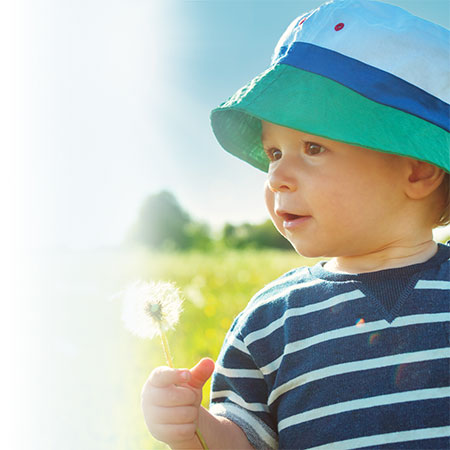The sun delights both children and their parents. To safely enjoy it, stringent precautionary measures should be taken.
The sun: a child’s friend or foe?
In summer, we love to have fun, take a stroll, or spend time with family under the warm sun. There are so many ways to appreciate the wonders of nature: the sweet smell of grass, a butterfly in flight, games in the sand, the rustling sound of the wind in the trees, etc. Be careful however, summer also has its share of risks for both children and adults and being aware of this can save you a lot of worry.
Exposure to the sun can represent a threat to anyone’s health, but especially for babies and young children. Their thin and sensitive skin is more vulnerable to the damaging effects of the sun’s rays. Among other things, they are more at risk of having immediate complications to too much sun, such as sunburn and heatstroke.
Moreover, repeated or excessive sunburns and sun exposure before the age of 19 leads to cellular damage to the skin, which greatly increases the risk of skin cancer in the long-term. Consequently, all small children, even those with very dark skin, need maximum sun protection.
A few tips about sun protection
Here are a few measures you can take to reduce your child’s sun exposure:
- Don’t use sunscreen on a child under six months of age. Moreover, it is imperative that you avoid exposing him/her to the sun. Ideally, this recommendation should be followed during the first year of life. To do this, you may:
- use an opaque blanket, stroller canopy or sun shade;
- go out for a stroll early in the morning, around dinner time or in the evening;
- go indoors or find a sun protected area as soon as you can;
- If you apply a sunscreen to a baby between the ages of 6 months and a year, limit the application to exposed areas, such as the hands, feet, face, etc. Have your baby wear clothes that cover as much of the skin’s surface as possible.
- Have your baby wear a wide-brimmed hat, with a flap in the back if possible, to protect the scalp, neck and face. Prevent him/her from removing it.
- Limit exposure to the sun as much as possible. Even with sun protection, avoid sun exposure between 11:00 a.m. and 4:00 p.m. (time during which the sun’s rays are at their strongest) and prolonged sun exposure.
- Don’t rely on the presence of clouds to protect your child from the sun, as they are not an effective barrier against sun rays.
- Look for sun-free or shady areas. Get a large parasol.
- Children should also wear sunglasses with UV-protected lenses that offer large coverage of the eyes and upper face.
- Remember that sand and water reflect sun rays, so exposure to them is increased when you are on a beach or boat.
- Choose a sunscreen for your child carefully and apply it generously at regular intervals, every two hours or sooner. After swimming or if your child sweats a lot, reapply it promptly.
- If, despite this, your child under a year old gets a sunburn, see a doctor right away. This is a medical emergency. This is especially the case for heatstroke. When in doubt, never take a chance, seek immediate medical attention.
- To avoid dehydration, make sure your child drinks plenty of water while he/she is exposed to the sun.
How to choose a sunscreen
There are a number of sun protection products available on the market: creams, mousse, sprays, etc. With such a large array of products, it can be difficult to make a choice. Your pharmacist is always available to give you tips when selecting a product and about sun protection in general. Don’t hesitate to talk to him/her.
Nonetheless, here is some criteria you should base your sunscreen choice on for your little one. Choose a formulation that:
- provides strong protection against UVA and UVB rays;
- has a high sun protection factor (at least 30, ideally higher);
- is designed for babies or children;
- is hypoallergenic;
- doesn’t contain any alcohol or fragrance;
- is waterproof;
- appeals to your tastes and of those of your child from a cosmetic perspective;
- is of good quality;
Speak to your pharmacist for additional information about sun protection and the products intended for this use.


